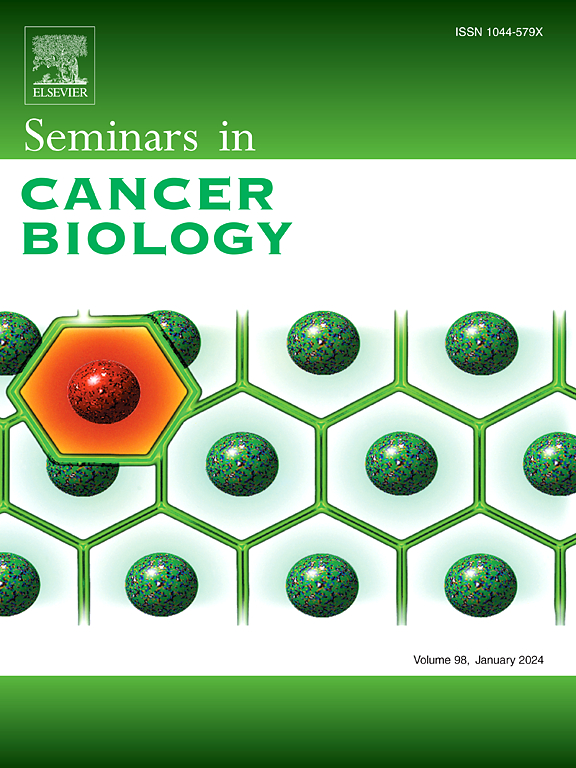利用稳定同位素分析肿瘤代谢途径
IF 12.1
1区 医学
Q1 ONCOLOGY
引用次数: 0
摘要
代谢重编程是恶性转化和癌症进展的关键。肿瘤代谢是由尚未完全阐明的内在和外在因素的复杂相互作用形成的。揭示肿瘤在患者体内复杂的代谢活动具有重要的价值。代谢通量分析(MFA)是一种研究肿瘤体内代谢的通用技术,近十年来越来越多地应用于肿瘤代谢活性的评估。稳定同位素示踪表明,人类肿瘤使用不同的营养物质来促进中心代谢途径,如三羧酸循环和大分子合成。肿瘤究竟如何使用不同的燃料,以及替代代谢途径在肿瘤进展中的作用,仍然是深入研究的领域。在这篇综述中,我们系统地总结了来自肿瘤体内稳定同位素示踪的证据,并描述了与肿瘤代谢改变有关的分解代谢和合成代谢过程。我们还讨论了MFA在人类癌症研究中的当前挑战和未来展望,这可能为癌症的诊断和治疗提供新的途径。本文章由计算机程序翻译,如有差异,请以英文原文为准。
Metabolic pathway analysis of tumors using stable isotopes
Metabolic reprogramming is pivotal in malignant transformation and cancer progression. Tumor metabolism is shaped by a complex interplay of both intrinsic and extrinsic factors that are not yet fully elucidated. It is of great value to unravel the complex metabolic activity of tumors in patients. Metabolic flux analysis (MFA) is a versatile technique for investigating tumor metabolism in vivo, it has increasingly been applied to the assessment of metabolic activity in cancer in the past decade. Stable-isotope tracing have shown that human tumors use diverse nutrients to fuel central metabolic pathways, such as the tricarboxylic acid cycle and macromolecule synthesis. Precisely how tumors use different fuels, and the contribution of alternative metabolic pathways in tumor progression, remain areas of intensive investigation. In this review, we systematically summarize the evidence from in vivo stable- isotope tracing in tumors and describe the catabolic and anabolic processes involved in altered tumor metabolism. We also discuss current challenges and future perspectives for MFA of human cancers, which may provide new approaches in diagnosis and treatment of cancer.
求助全文
通过发布文献求助,成功后即可免费获取论文全文。
去求助
来源期刊

Seminars in cancer biology
医学-肿瘤学
CiteScore
26.80
自引率
4.10%
发文量
347
审稿时长
15.1 weeks
期刊介绍:
Seminars in Cancer Biology (YSCBI) is a specialized review journal that focuses on the field of molecular oncology. Its primary objective is to keep scientists up-to-date with the latest developments in this field.
The journal adopts a thematic approach, dedicating each issue to an important topic of interest to cancer biologists. These topics cover a range of research areas, including the underlying genetic and molecular causes of cellular transformation and cancer, as well as the molecular basis of potential therapies.
To ensure the highest quality and expertise, every issue is supervised by a guest editor or editors who are internationally recognized experts in the respective field. Each issue features approximately eight to twelve authoritative invited reviews that cover various aspects of the chosen subject area.
The ultimate goal of each issue of YSCBI is to offer a cohesive, easily comprehensible, and engaging overview of the selected topic. The journal strives to provide scientists with a coordinated and lively examination of the latest developments in the field of molecular oncology.
 求助内容:
求助内容: 应助结果提醒方式:
应助结果提醒方式:


